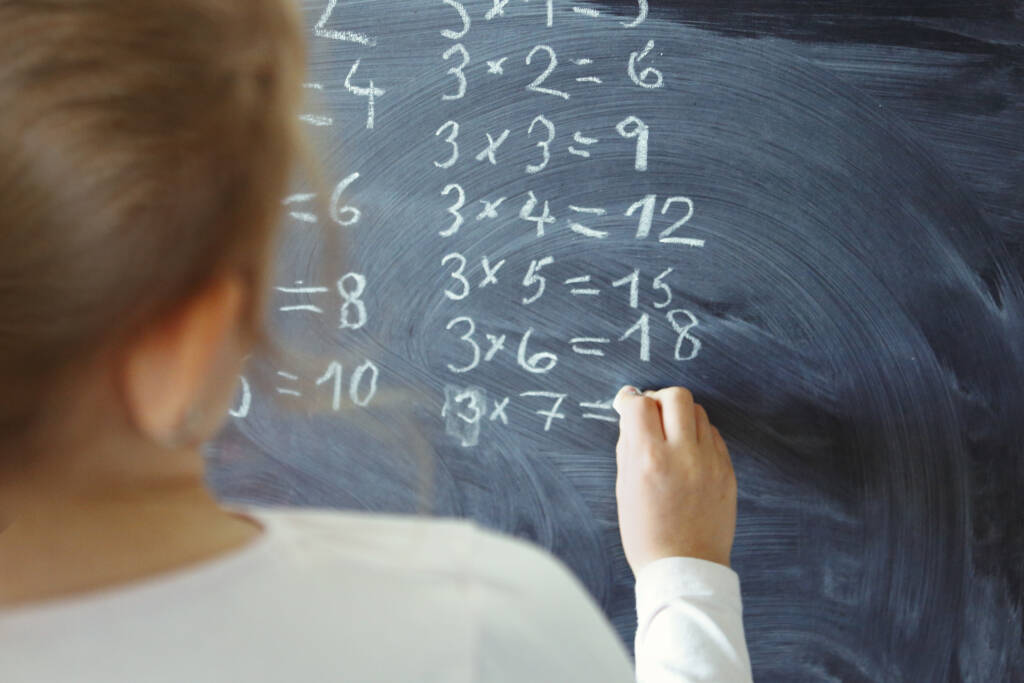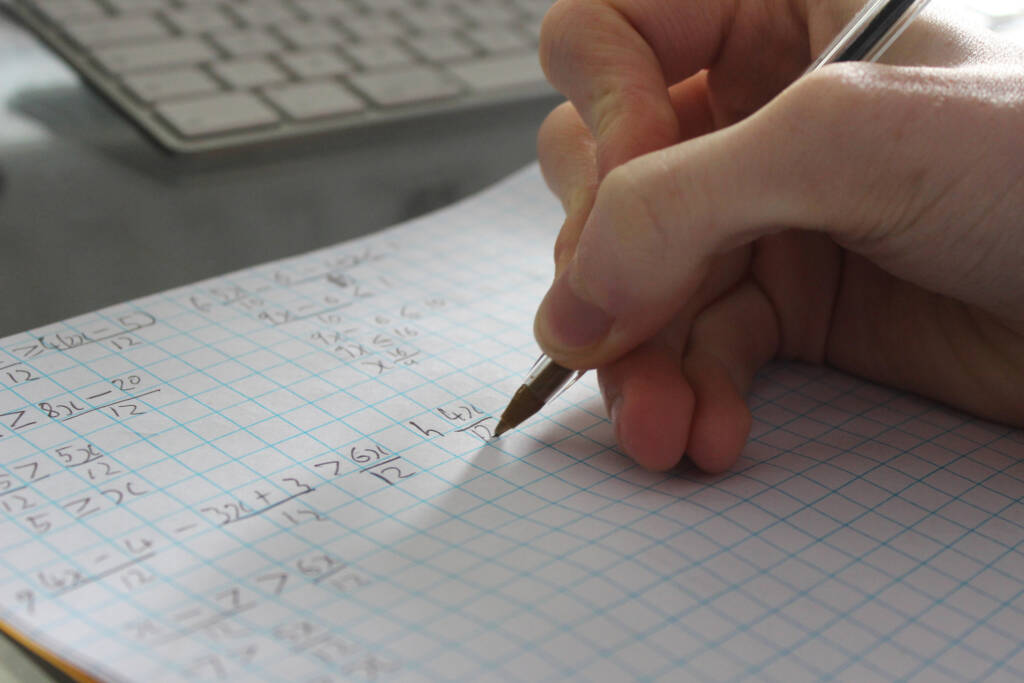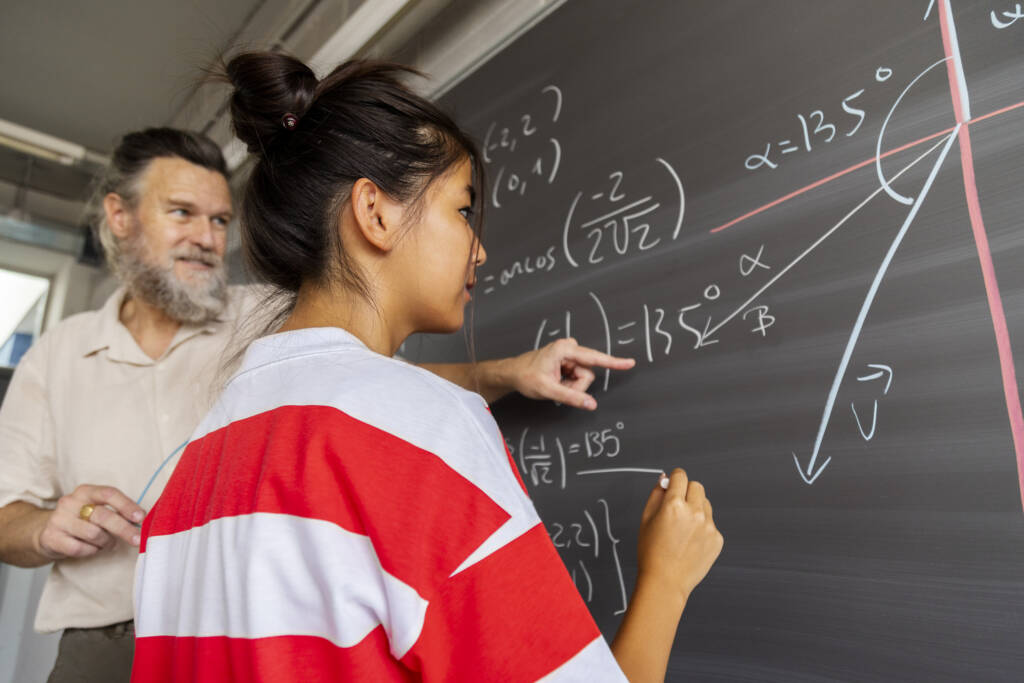
Middle School Pre-Algebra (Grade 8)

Read, set, go! Grade 8 Pre-Algebra is all about training to run the race of high school math. Students will strengthen their skills in topics like linear relationships, functions, and equations, and learn new skills that prepare them for Algebra 1. This course is designed with interactive learning and real-world activities to strengthen students’ math muscles for the race ahead.
Major Topics and Concepts
Segment One
- Define irrational numbers within the real number system and locate an approximate value of a numerical expression involving irrational numbers on a number line
- Plot, order, and compare rational and irrational numbers, represented in various forms
- Apply the Laws of Exponents to evaluate numerical expressions and generate equivalent numerical expressions, limited to integer exponents and rational number bases, with procedural fluency
- Solve multi-step problems involving the order of operations with rational numbers including exponents and radicals
- Express numbers in scientific notation to represent and approximate very large or very small quantities
- Add, subtract, multiply, and divide numbers expressed in scientific notation with procedural fluency
- Solve problems involving operations with numbers expressed in scientific notation
- Apply the Laws of Exponents to generate equivalent algebraic expressions, limited to integer exponents and monomial bases
- Apply properties of operations to multiply two linear expressions with rational coefficients
- Rewrite the sum of two algebraic expressions having a common monomial factor as a common factor multiplied by the sum of two algebraic expressions
- Solve multi-step linear equations in one variable, with rational number coefficients, including equations with variables on both sides
- Determine the real solutions given an equation in the form of x² = p and x³ = q, where p is a whole number and q is an integer
- Solve two-step linear inequalities in one variable and represent solutions algebraically and graphically
- Apply the Pythagorean Theorem to solve problems involving unknown side lengths in right triangles
- Use the Triangle Inequality Theorem to determine if a triangle can be formed from a given set of sides
- Use the Pythagorean Theorem to determine if a right triangle can be formed from a given set of sides
- Apply the Pythagorean Theorem to solve problems involving the distance between two points in a coordinate plane
- Solve problems involving the relationships between supplementary, complementary, vertical, or adjacent angles
- Solve problems involving the relationships of interior and exterior angles of a triangle
- Develop and use formulas for the sums of the interior angles of regular polygons by decomposing them into triangles
Segment Two
- Determine if a linear relationship is also a proportional relationship
- Determine slope given a table, graph, or written description of a linear relationship
- Write an equation in slope-intercept form given a table, graph, or written description of a linear relationship
- Determine and interpret the slope and y-intercept of a two-variable linear equation from a written description, a table, a graph, or an equation in slope-intercept form
- Graph a two-variable linear equation from a written description, a table, or an equation in slope-intercept form
- Given a system of two linear equations and a specified set of possible solutions, determine which ordered pairs satisfy the system of linear equations
- Given a system of two linear equations represented graphically on the same coordinate plane, determine whether there is one solution, no solution, or infinitely many solutions
- Solve systems of two linear equations by graphing
- Given a set of ordered pairs, a table, a graph, or a mapping diagram, determine whether the relationship is a function.
- Identify the domain and range of the relation
- Analyze a written description or graphical representation of a functional relationship between two quantities and identify where the function is increasing, decreasing or constant
- Determine whether a function is a linear function given a graph, equation, or input-output table
- Construct a scatter plot or a line graph as appropriate for the context given a set of real-world bivariate numerical data
- Describe patterns of association given a scatter plot within a real-world context
- Informally fit a straight line given a scatter plot with a linear association
- Determine the sample space for a repeated experiment
- Find the theoretical probability of an event related to a repeated experiment
- Solve problems involving probabilities related to single or repeated experiments, including making predictions based on theoretical probability
- Given a preimage and image generated by a single transformation, identify the transformation that describes the relationship
- Describe and apply the effect of a single transformation on two-dimensional figures using coordinates and the coordinate plane
- Given a preimage and image generated by a single dilation, identify the scale factor that describes the relationship
- Solve problems involving proportional relationships between similar triangles
Course Materials
To achieve success, students are expected to submit work in each course weekly. Students can learn at their own pace; however, “any pace” still means that students must make progress in the course every week. To measure learning, students complete self-checks, practice lessons, multiple choice questions, projects, discussion-based assessments, and discussions. Students are expected to maintain regular contact with teachers; the minimum requirement is monthly. When teachers, students, and parents work together, students are successful.
Competencies
Angles and Triangles
Students will demonstrate an understanding of angles and triangles by explaining triangle and angle theorems, solving problems on a coordinate plane, describing angle relationships, and explaining polygon angle sums.
Foundations of Numerical Expressions
Students will demonstrate an understanding of the foundations of numerical expressions by describing irrational numbers, explaining laws of exponents, solving problems using order of operations, and explaining scientific notation.
Fundamentals of Algebraic Equations and Inequalities
Students will demonstrate an understanding of the fundamentals of algebraic equations and inequalities by explaining operations of linear expressions, solving multi-step linear equations, solving equations using square and cube roots, and solving two-step linear inequalities.
Foundations of Linear Equations
Students will demonstrate an understanding of the foundations of linear equations by describing linear relationships, explaining slope and y-intercept relationships, graphing linear equations, and explaining systems of linear equations.
Foundations of Statistics and Probability
Students will demonstrate an understanding of the foundations of statistics and probability by explaining types of functions, describing applications of scatter plots, and solving probability problems.
Foundations of Transformations
Students will demonstrate an understanding of the foundations of transformations by describing features of transformations, describing types of reflections and rotations, explaining the importance of dilations, and solving similar triangle problems.

